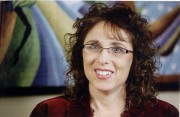Student Counselors Must Learn to Ignore Personal Beliefs
University of Missouri Professor leads effort to set standards for college counseling programs
October 11th, 2010
COLUMBIA, Mo. – The issue of student counselors’ personal beliefs interfering with their work has generated controversies and lawsuits at college campuses across the nation. While the courts have consistently sided with universities, the aftermath has led faculty in university counseling psychology departments to clarify a basic tenet of the profession: personal values must be checked at the door when you enter the counseling session.

Laurie Mintz, professor of educational, school and counseling psychology in the University of Missouri College of Education.
The recent court cases involving Augusta State University and Eastern Michigan University center around Christian counselors who claim discrimination after they have expressed conservative views on homosexuality. In both cases, the federal courts have ruled in favor of the standards set by counseling programs that all clients must be treated equally regardless of the counselors’ personal beliefs. Other universities have dealt with situations where students have expressed dismay with clients who are considering abortion, or with counseling students who have displayed anti-fat, anti-poor, sexist, or racist attitudes.
Laurie Mintz, professor of educational, school and counseling psychology in the University of Missouri College of Education, has been highly active in guiding collegiate counseling programs to set the standard for professional behavior.
“This issue is not gays and lesbians versus Christianity; this is about the ethics of our field,” Mintz said. “Our ethics codes are very clear: we serve a diverse population and we leave our values at the door. Counselors are there to help people grow and develop, and unless it has to do with legal requirements – such as cases of child abuse – it is against our ethical codes to judge clients’ behavior as immoral or not as meeting some value standard.”
To that end, Mintz, along with colleagues from across the country, has been instrumental in creating the model statement for counseling psychology training communities. The statement has been endorsed by professional organizations including the American Psychological Association Division of Counseling Psychology, the Association of Counseling Center Training Agencies and others. This document states that even though no person is “completely free from all forms of bias and prejudice,” that counselors and students are “expected to be committed to critical thinking and self-examination” in order to work effectively with anyone whose beliefs or identities are different from their own. The model statement, and a series of articles discussing it’s implementation, was recently published in an issue of The Counseling Psychologist that Mintz co-edited with Dr. Kathleen Bieschke from Pennsylvania State University. This issue of The Counseling Psychologist won the “2010 Major Contribution of the Year” award from APA’s Division of Counseling Psychology.
Mintz notes that while the issue may be more prominent today, the field itself has been consistent in respecting others, no matter what issues the client brings to the session.
“This is an important learning opportunity for students as they consider counseling as their profession, because they really need to think about the people they will encounter. Part of becoming a counselor is self-examination and reflection of personal attitudes, beliefs, opinions, feelings and personal history. If counseling students cannot perform the basic duties of the position, they may need to find another career,” Mintz said.

